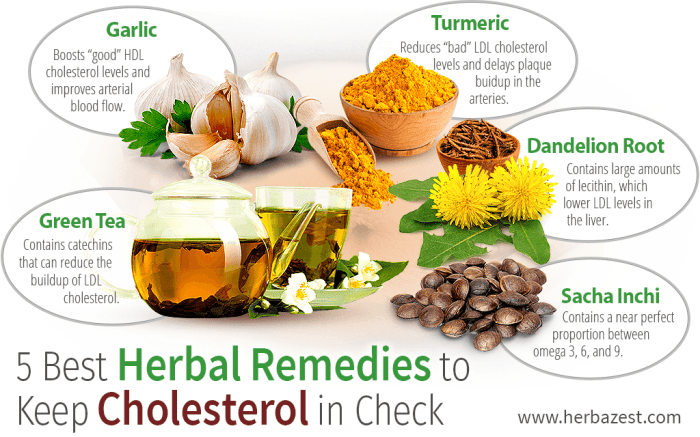Herbs for reducing cholesterol, dive into the world of natural remedies that can help you maintain a healthy heart and lower your cholesterol levels. From common herbs to dosage recommendations, we’ve got you covered.
Overview of Cholesterol and Herbs
Cholesterol is a waxy substance found in the blood and is essential for building healthy cells. However, high levels of cholesterol can lead to plaque buildup in the arteries, increasing the risk of heart disease and stroke. Common herbs known for their cholesterol-reducing properties include:
Garlic
- Garlic contains allicin, which has been shown to lower cholesterol levels and reduce the risk of heart disease.
- It also helps improve circulation and lower blood pressure.
Turmeric
- Curcumin, the active compound in turmeric, has anti-inflammatory properties that can lower cholesterol and prevent plaque buildup in the arteries.
- It also supports overall heart health and reduces the risk of blood clots.
Ginger
- Ginger can lower cholesterol levels and reduce the risk of heart disease by improving blood circulation and reducing inflammation.
- It also helps in managing blood sugar levels, which is beneficial for heart health.
Using herbs as a natural remedy for cholesterol management can offer several benefits, including fewer side effects compared to medications, improved overall health, and the convenience of incorporating them into daily meals or teas for added flavor and health benefits.
Top Herbs for Reducing Cholesterol

When it comes to lowering cholesterol levels, certain herbs have shown promising results in supporting cardiovascular health. These herbs work in various ways to reduce cholesterol in the body, providing a natural alternative to traditional medications. Here are some of the top herbs known for their cholesterol-lowering properties:
Garlic
- Garlic contains allicin, a compound that has been shown to lower cholesterol levels by inhibiting cholesterol synthesis in the liver.
- Recommended dosage: 600-1,200 mg of garlic extract per day.
- Potential side effects: Garlic may cause bad breath, body odor, and gastrointestinal discomfort in some individuals.
Turmeric
- The active compound in turmeric, curcumin, has antioxidant and anti-inflammatory properties that can help reduce LDL (bad) cholesterol levels.
- Recommended dosage: 500-2,000 mg of turmeric extract per day.
- Potential side effects: Turmeric may interact with certain medications and can cause stomach upset in some individuals.
Ginger
- Ginger contains gingerol, a bioactive compound that has been studied for its cholesterol-lowering effects and anti-inflammatory properties.
- Recommended dosage: 1,000-1,500 mg of ginger extract per day.
- Potential side effects: Ginger may cause mild side effects such as heartburn and digestive issues in some people.
Herbal Remedies vs. Conventional Medication
When it comes to managing cholesterol levels, there is a growing interest in using herbal remedies as an alternative to conventional medications. Let’s explore the effectiveness, advantages, and disadvantages of using herbs for reducing cholesterol compared to prescription drugs.
Effectiveness Comparison
- Herbal remedies have shown promising results in lowering cholesterol levels, although the evidence is not as extensive as that for conventional medications.
- Conventional medications like statins are known to be highly effective in reducing cholesterol levels and preventing cardiovascular diseases.
- Individual responses to herbal remedies may vary, making it important to consult with a healthcare provider for personalized recommendations.
Advantages and Disadvantages
- Advantages: Herbal remedies are often perceived as natural and may have fewer side effects compared to prescription drugs. They can also be more accessible and affordable for some individuals.
- Disadvantages: The potency and effectiveness of herbal remedies can vary, leading to inconsistent results. There may also be limited scientific research supporting their use for cholesterol management.
- Caution: It is crucial to note that some herbs may interact with existing medications or have contraindications for certain health conditions, emphasizing the need for professional guidance.
Combining Herbs with Medications
- Some individuals choose to incorporate herbal remedies into their cholesterol management plan while taking conventional medications.
- Consulting with a healthcare provider is essential to ensure the safe and effective combination of herbs with existing medications, minimizing the risk of adverse interactions.
- Regular monitoring of cholesterol levels and overall health is recommended when using a combination approach to ensure optimal outcomes.
Lifestyle Changes and Herbal Interventions: Herbs For Reducing Cholesterol
When it comes to managing cholesterol levels, incorporating lifestyle changes alongside herbal interventions can play a crucial role in promoting overall heart health. By focusing on diet modifications, regular exercise, and the use of specific herbs known for their cholesterol-lowering properties, individuals can take a holistic approach to maintaining healthy cholesterol levels.
Diet Modifications for Cholesterol Reduction
Implementing a heart-healthy diet is essential for managing cholesterol levels. This includes reducing the intake of saturated and trans fats, increasing fiber-rich foods like fruits, vegetables, and whole grains, and incorporating plant-based proteins. Additionally, consuming foods rich in omega-3 fatty acids, such as fatty fish, can help lower cholesterol levels.
Exercise and Physical Activity
- Regular exercise, such as aerobic activities like walking, running, or cycling, can help raise HDL (good) cholesterol levels and lower LDL (bad) cholesterol levels.
- Strength training exercises, like weightlifting, can also contribute to improved heart health and cholesterol management.
- Engaging in at least 150 minutes of moderate-intensity exercise per week is recommended for optimal cholesterol reduction.
Integrating Herbal Remedies into Daily Routine, Herbs for reducing cholesterol
Herbal interventions can complement diet and exercise in managing cholesterol levels. Some herbs known for their cholesterol-lowering properties include:
- Garlic: Contains allicin, a compound that may help lower cholesterol levels.
- Turmeric: Curcumin, the active compound in turmeric, has been linked to reduced LDL cholesterol and increased HDL cholesterol.
- Ginger: Known for its anti-inflammatory properties, ginger may also help lower cholesterol levels.
- Hawthorn: Used traditionally to support heart health, hawthorn may aid in cholesterol management.
